Discover our comprehensive suite of services developed for climate action and carbon project validation and verification. With a focus on mitigating climate change, our expertise spans carbon projects, nature-based solutions, and the Voluntary Carbon Market.
Jump to a specific section:
- What are carbon projects?
- What is the Voluntary Carbon Market (VCM)?
- What are carbon credits?
- How can we support you?
- Why choose us?
Climate change, caused by human activities such as burning fossil fuels and deforestation, poses severe threats. It leads to rising temperatures, extreme weather events, sea-level rise and biodiversity loss. Mitigation aims to reduce these impacts by cutting emissions and enhancing carbon absorption to stabilise the climate and protect ecosystems. Carbon projects play a key role in mitigation efforts.
What are carbon projects?
Carbon projects, also known as carbon offset projects, are verified activities that reduce, avoid or remove greenhouse gas emissions. These activities can involve environmental conservation, energy efficiency or renewable energy. They contribute to mitigating climate change by generating carbon credits.
Nature-based Solution projects take a strategic approach to mitigating climate change. Projects like afforestation, reforestation and soil carbon sequestration through agroforestry and regenerative agriculture leverage the natural power of ecosystems to store carbon. Unlike traditional methods that rely solely on technology, Nature-based Solution projects harness nature's ability to combat global warming. These initiatives support emission reduction and removal efforts, often in developing countries, by providing financial incentives through carbon credits.
What is the Voluntary Carbon Market (VCM)?
The VCM is a platform where individuals, corporations and entities can voluntarily participate in activities that reduce greenhouse gas emissions. Participants generate, buy and sell carbon credits outside of mandatory carbon pricing mechanisms.
Governed by private carbon standards, the VCM supports various climate mitigation activities beyond regulated programmes. Driven by corporate commitments, consumer interest and investor demand, the VCM offers flexibility to address climate change, biodiversity protection and the Sustainable Development Goals (SDGs). This flexibility has the potential to significantly increase demand for carbon credits.
What are carbon credits?
Each carbon credit represents one metric ton of reduced, avoided or removed CO2 (or equivalent greenhouse gas). They serve as tangible proof of your commitment to sustainability. Once used to offset emissions, a credit becomes retired and is no longer tradeable.
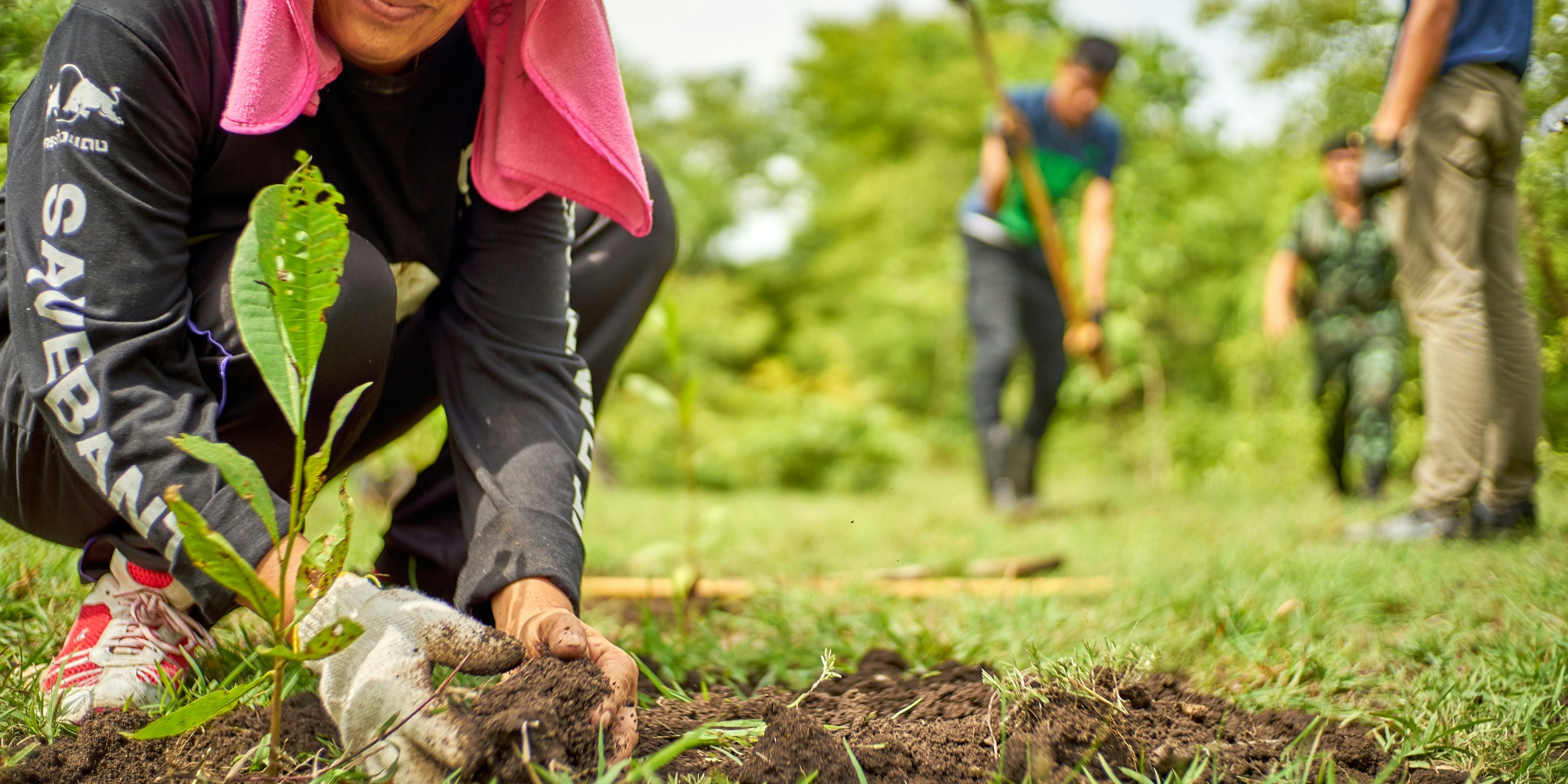
How can we support you?
At Preferred by Nature, we believe carbon project validation and verification are crucial for high-quality carbon credits that contribute to real climate action. We play a critical role in the carbon project process as an independent third-party validator and verifier. With 30 years of experience in sustainability assurance within the land-use sector, we bring a wealth of expertise to Nature-based Solution carbon projects.
We assess project design documents to ensure they adhere to recognised methodologies and deliver promised carbon benefits. We also independently evaluate project implementation and quantify the actual carbon reductions achieved, providing transparency and credibility.
By rigorously validating and verifying Nature-based Solution projects, we ensure their environmental integrity and the legitimacy of generated carbon credits. This fosters trust in the VCM and enables organisations to confidently offset their emissions while supporting projects that truly contribute to mitigating climate change.
>> Download our info sheet to learn more
Why choose us?
- Exceptional quality service: Validation and verification are mandatory for issuing carbon credits. We provide this service with the highest quality standards.
- Trusted experience: Backed by 30 years of experience in land-use sustainability audits across 100+ countries, we offer a proven track record of excellence.
- Global reach for impact: We operate worldwide, supporting land-use projects that deliver positive environmental and social benefits.
- Transparency and risk management: With a focus on transparency, we stay ahead of industry trends, adjusting our methods to mitigate evolving risks, ensuring your project’s compliance and long-term impact.
- Comprehensive services: Our Climate & Ecosystem Restoration experts offer a variety of services, including verification against Preferred by Nature’s Carbon Footprint Management and Ecosystem Restoration Standards.
Preferred by Nature is an approved Validation and Verification Body (VVB) for Verra, the Gold Standard and Plan Vivo. Explore the additional tabs on this page to learn more about project types, available services/schemes, and additional options for effective ecosystem restoration and carbon footprint management. We are eager to assist you in your carbon project validation/verification journey.
Project types
Explore the range of projects eligible for validation/verification, prioritising quality and adherence to credible standards for positive environmental, socioeconomic and climate impacts.
The Agriculture, Forestry and Other Land Use (AFOLU) sector contribute to almost 30% of global greenhouse gas emissions, making it the largest emitting sector after energy, with emissions projected to rise.
The projects we evaluate primarily focus on nature-based solutions, such as Afforestation, Reforestation, and Revegetation (ARR) or Improved Forest Management (IFM) activities. We work with globally recognised standards including Verra (VCS and CCB), the Gold Standard and Plan Vivo.
 Nature-based solutions represent close to 50% of the Voluntary Carbon Market. This involves forestry, agriculture, grasslands, wetlands, and livestock & manure.
Nature-based solutions represent close to 50% of the Voluntary Carbon Market. This involves forestry, agriculture, grasslands, wetlands, and livestock & manure.
Scopes and types of AFOLU projects
| ACoGS | Avoided Conversion of Grasslands and Shrublands |  |
| ARR | Afforestation, Reforestation and Revegetation To increase stocks | 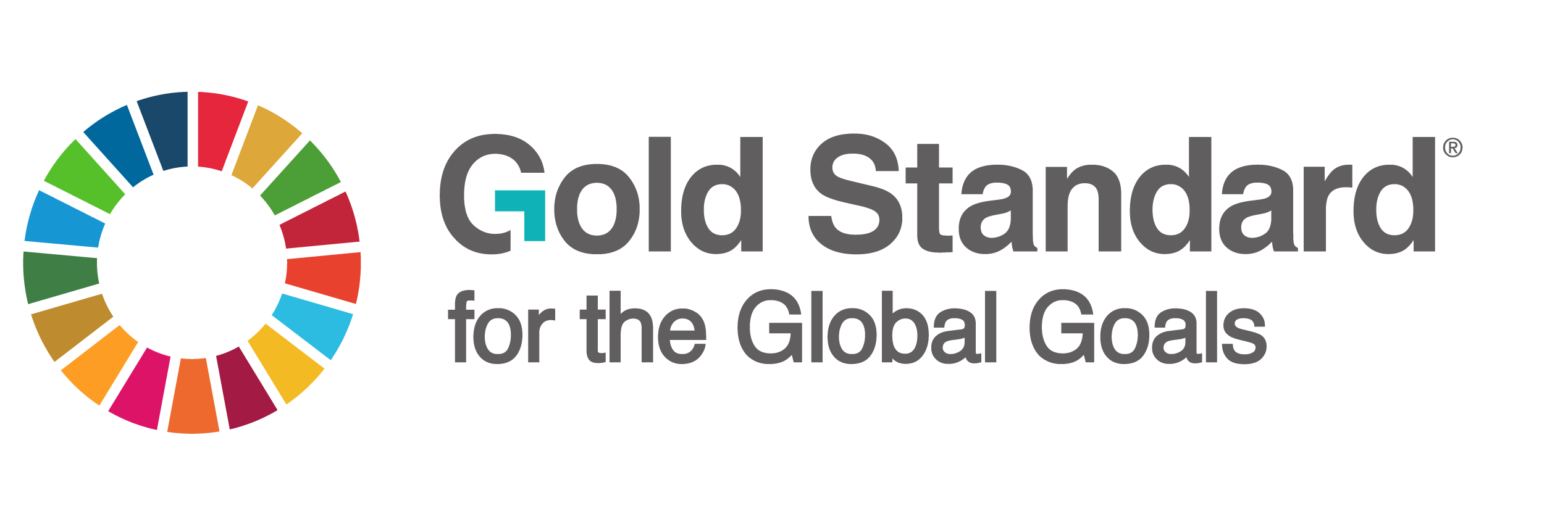  |
| IFM | Improved Forest Management To increase stocks
|  |
| ALM | Agricultural Land Management To increase stocks or reduce emissions from soils
| 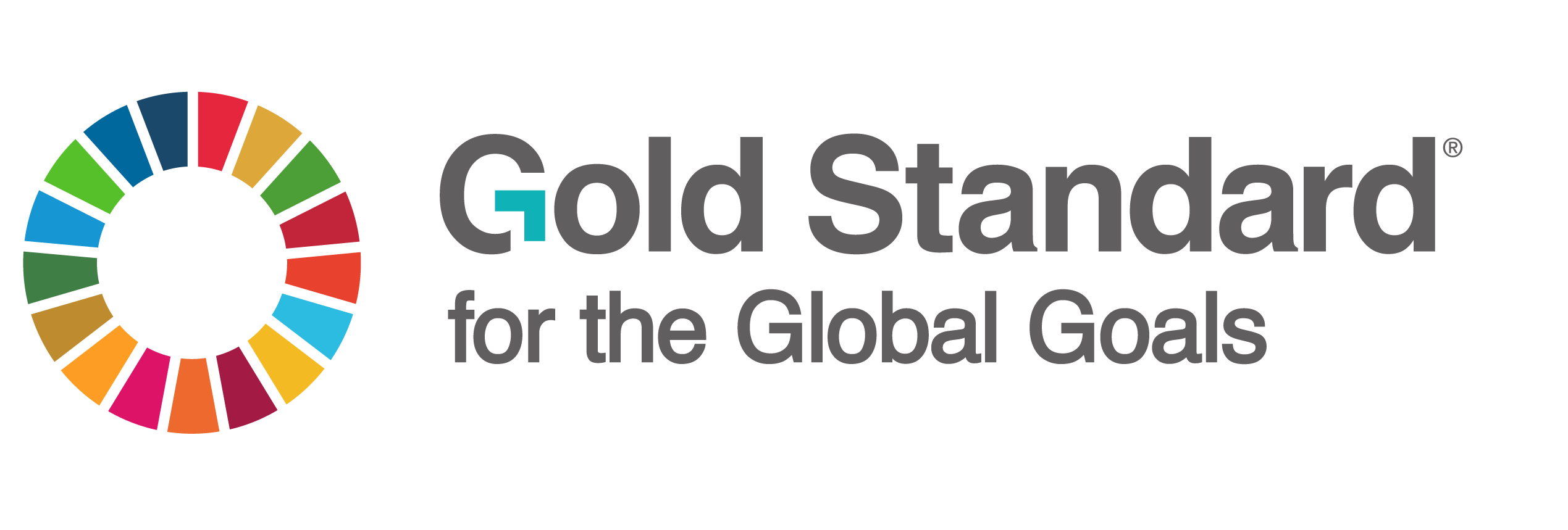  |
| WRC | Wetlands Restoration and Conversion |  |
Additional options
We have developed programmes that can support your carbon offsetting and promote sustainable practices benefiting people, nature and climate.
Preferred by Nature Certification
The Preferred by Nature Certification is based on our Sustainability Framework which consists of four principles, with 25 criteria and 159 indicators. The Framework is designed to support organisations and businesses in meeting corporate commitments as well as market and regulatory demands towards sustainability in land management, trade and processing of forest and agricultural commodities. Indicators relevant to the EU Deforestation Regulation (EUDR) have been specified to help organisations focus their efforts if they wish to seek compliance with the Regulation.
This Standard is versatile, applicable to any land use (including forests and farms), agricultural or natural resource supply chain, product or commodity impacting nature, people and climate.
It is adaptable across different commodities and risk levels. For organisations seeking external recognition of their sustainability performance, Preferred by Nature can verify conformance against the entire Sustainability Framework or a subset of its criteria.
Carbon Footprint Management
Our Carbon Footprint Management programme offers a variety of services aligning with your business needs. The integrated support approach to carbon footprint management provides knowledge, tools and methods to help you better manage and verify GHG emissions across your business, products or specific projects.
Our Standard enables you to measure and reduce your GHG emissions, achieve carbon neutrality through offsetting, and use labels and claims following your verification.
Ecosystem Restoration
Our Ecosystem Restoration Standard guides your verification journey in implementing ecosystem restoration. This Standard audits performance at any scale and stage of an ongoing restoration process or project (i.e., implementation of restoration interventions has started) in tropical, temperate and boreal biomes, combining technical, environmental, social and economic requirements.
If you are a project manager, verification against this Standard can guide you to identify potential gaps in your project – even by using the Standard as a checklist. It will also help in communicating about the efforts and demonstrating that resources are invested in the right direction, taking into account the social and environmental conditions of the restoration areas.
Carbon standard selection
Carbon offset schemes enable individuals and companies to invest globally in environmental projects, offsetting their carbon footprints.
Validation/Verification bodies (VVB) organisations ensure projects align with their stated objectives and emissions reductions/removals.
We assess carbon projects using renowned international standards like Verra (VCS and CCB), the Gold Standard and Plan Vivo. These standards define methodologies, rules and requirements, validating projects as proven methods for reducing carbon emissions.
Verra
 Founded in 2007, Verra is one of the leaders in the voluntary carbon markets (VCMs), managing programmes globally to generate meaningful environmental and social value.
Founded in 2007, Verra is one of the leaders in the voluntary carbon markets (VCMs), managing programmes globally to generate meaningful environmental and social value.
It sets standards for diverse activities such as reducing deforestation, improving agricultural practices, addressing plastic waste and promoting gender equality. Verra certifies that these activities achieve measurable, high-integrity outcomes.
Available programmes
Verified Carbon Standard Program (VCS)
VCS, the world’s most widely used greenhouse gas crediting programme, channels finance toward emission reduction activities, improving livelihoods and protecting nature. VCS projects have reduced or removed nearly one billion tons of carbon and other GHG emissions from the atmosphere.
VCS Programme leads the way in developing methodologies and tools to unlock the carbon reduction potential of AFOLU projects. These natural climate solutions encompass forestry, agriculture, grasslands, wetlands and livestock. Projects in the AFOLU sector, certified by VCS, undergo a rigorous assessment process and can be issued issue Verified Carbon Units (VCUs) for monetisation in the carbon market, supporting and scaling up climate change mitigation activities.
Preferred by Nature Project Scopes
- ACoGS: Avoided Conversion of Grasslands and Shrublands
- ARR: Afforestation, Reforestation and Revegetation
- IFM: Improved Forest Management
- ALM: Agricultural Land Management
- WRC: Wetlands Restoration and Conversion
Climate, Community & Biodiversity (CCB) Program
Verra’s CCB Program supports land use projects in addressing climate change, benefitting local communities and smallholders, and conserving biodiversity. The CCB Standards are applicable to any land management project. They can be applied exclusively to a project or in conjunction with VCS certification.
Verra VCS MAP – Verified Carbon Standard | Methodology Approval Process
For projects outside existing methodologies, project developers can create a new methodology through VERRA’s methodology approval process (MAP). Preferred by Nature is an approved third-party to review and validate proposed methodologies under MAP.
The Gold Standard
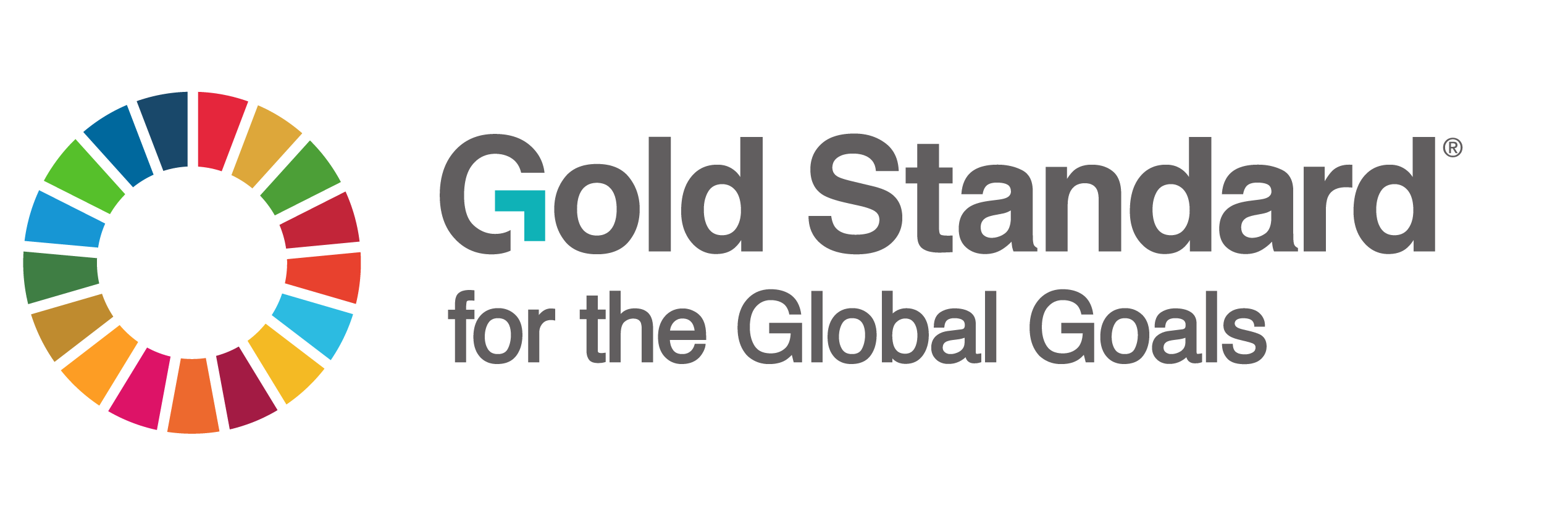 Established in 2003, the Gold Standard ensures projects reducing carbon emissions feature high environmental integrity, contributing to sustainable development. Rigorous safeguards, stakeholder engagement and advanced methodologies ensure that projects not only meet climate and SDG targets but also garner price premiums for environmental commodities like carbon credits.
Established in 2003, the Gold Standard ensures projects reducing carbon emissions feature high environmental integrity, contributing to sustainable development. Rigorous safeguards, stakeholder engagement and advanced methodologies ensure that projects not only meet climate and SDG targets but also garner price premiums for environmental commodities like carbon credits.
The process is fully digitalised, partnering with SustainCERT, the official certification body for Gold Standard for the Global Goals. This collaboration aims to streamline costs and simplify the certification process. The Gold Standard’s NGO Supporter Network and strategic partnership with industry thought leaders help maintain the highest standards for climate and development initiatives.
Preferred by Nature Project scopes
- ARR: Afforestation, Reforestation and Revegetation
- ALM: Agricultural Land Management
Plan Vivo
 Plan Vivo, originating in 1994 as a pilot research project in Chiapas, Mexico, is a reliable standard for forestry, agricultural and land-use projects. It focuses on promoting sustainable development, improving rural livelihoods and enhancing ecosystem services.
Plan Vivo, originating in 1994 as a pilot research project in Chiapas, Mexico, is a reliable standard for forestry, agricultural and land-use projects. It focuses on promoting sustainable development, improving rural livelihoods and enhancing ecosystem services.
Projects under Plan Vivo work closely with rural smallholders and communities. The standard emphasises participatory design, ongoing stakeholder consultation, the use of native species and biodiversity enhancement within a variety of payments for ecosystem service schemes, including carbon sequestration and emissions reductions.
The standard is suitable for projects that:
- Protect and restore the environment
- Tackle climate change
- Support climate-sensitive communities
Preferred by Nature’s Project scopes
- ACoGS: Avoided Conversion of Grasslands and Shrublands
- ARR: Afforestation, Reforestation and Revegetation
- IFM: Improved Forest Management
- ALM: Agricultural Land Management
- WRC: Wetlands Restoration and Conversion
Info sheet
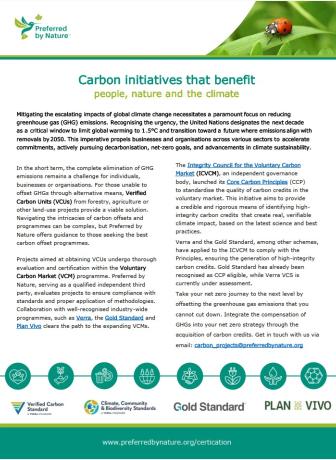
Carbon Projects Validation/Verification Services Info Sheet
Take your net zero journey to the next level by offsetting the greenhouse gas emissions that you cannot cut down. Integrate the compensation of GHGs into your net zero strategy th...
Take your net zero journey to the next level by offsetting the greenhouse gas emissions that you cannot cut down. Integrate the compensation of GHGs into your net zero strategy th...
Template
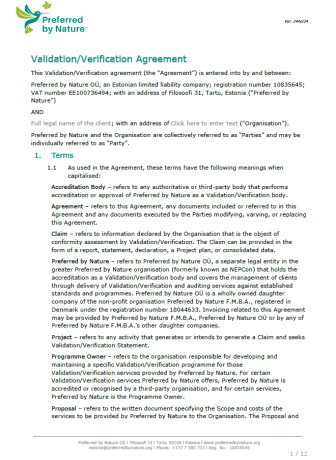
Preferred by Nature Validation/Verification Agreement Template
A template for generating Validation/Verification service agreement between Preferred by Nature and clients.
A template for generating Validation/Verification service agreement between Preferred by Nature and clients.
Get in contact with us
Our experts are ready to support you on your sustainability journey.





